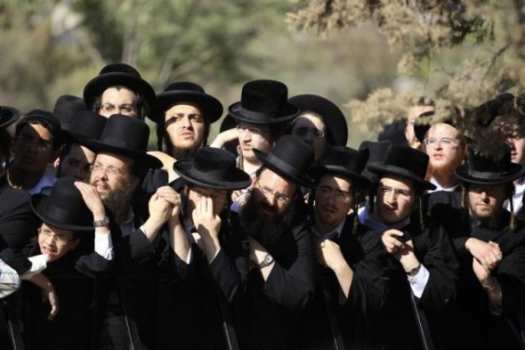
Holier Than Thou: How Religious Is Too Religious?
“What you are not allowed, you are not allowed, what you are allowed you need not.” (Rabbi Schneur Zalman of Liadi)
———————————
Can you be too religious? Ought one to deprecate a person whose religious observance seems “Over the top?” Are the terms “Ultra-Kosher,” or “Ultra-Orthodox,” really objective?
I always found it interesting how my observant grandparents and great grandparents were simply called “Jewish.” When Reform and Conservative Judaism made its debut my observant parents were called “Orthodox Jews,” and now with the increase of assimilation I’ve become an “Ultra Orthodox Jew.” You can be sure that I’m not any more religious than my grandfather or great grandfather, so why does my name keep changing?
This week’s portion, Kedoshim, narrated during Israel’s extended encampment at Mt. Sinai, commands us to be holy: “And G-d spoke to Moses saying: ‘Speak to the entire Community of Israel and tell them you must be Holy, for I, the Lord Your G-d, am Holy,’” (Vayikra 19:1-2).
The concept of holiness seems abstract. Holiness cannot be detected by means of the five senses. Holiness is not a visual experience, nor can it be heard, smelled, felt or tasted. Moreover, one person’s idea of holiness can be very different from another’s. In fact, to some people holiness is about the destruction of others – just consider all of the “Holy wars” fought over the course of human civilization. A precise definition of holiness is indeed elusive.
Still, the Torah does not speak of holiness as an abstract, remote quality, but rather one that is real and can be acquired.
It appears that this is why Rambam (Maimonides) interprets holiness as a general commandment: “In all the commandments that one performs one ought to strive to attain the sublime objective of holiness. Perhaps one could obey the commandments without specific intent, but holiness cannot be achieved without such intent.”
The commandments bring a person closer to holiness, but they do not confer holiness. Therefore we say, in the benedictions which we recite: “Who has sanctified us by His commandments” and not “Through whose commandments we have become sanctified.” Sanctity is not attained by obeying the commandments in a routine manner.
In order to become sanctified we must do more than simply obey the commandments. We are obliged to strive and act with specific intent in order to actually rise to holiness. By obeying the Mitzvos with intention we lift ourselves to a higher state. Holiness is, hence, not abstract or remote, but rather something that can be expressed in man’s every deed. When man’s deeds bespeak G-d’s praise, then his actions are holy.
The Torah’s approach to holiness is clearly irreconcilable with the notion that it represents some esoteric quality. The Torah’s view is that holiness is something real, concrete – attainable through man’s dedicated belief and behavior consistent with mitzvah observance.
Ramban (Nachmanides), in his famous analysis of this overarching commandment, explains how our approach and method of observing Torah and Mitzvos defines our level of holiness. It is not enough to technically observe the mitzvos; Torah observant Jews must be refined. He points out how one can observe all the laws of the Torah and still be a boor.
There are unproscribed things, asserts Nachmanides, things which are permitted by the Torah, from which one should nevertheless abstain. He cites, as an example, refraining from excessive sexual relations, excess drinking, and guarding one’s mouth from vulgar eating or vulgar speech. He dubs those who have these traits as “Naval Birshut HaTorah,” which amounts to a base person with a certificate of Kashrus, for after all, they do not violate the letter of the law.
In depicting this “Scoundrel with the permission of the Torah,” Nachmanides emphasizes the tendency of man to constantly seek out material and physical pleasure – while no particular prohibitions may be involved; the entire essence of Judaism is distorted by such attitudes.
“You shall be holy,” maintains the Ramban, is achieved by sanctifying yourself with that which is permitted to you. Only when you give up that which is permitted; when you initiate an act of giving something up, and only when it adds something to the commandments – a sort of value added component – only then does it lead to sanctity.
In summation, you cannot be too religious, or too holy, more than you can be too good or too happy. To be too holy is like being too in love; it’s one of those things that if a little bit is good then more is even better. Who could understand this better than a society that is proudly and unabashedly “Fanatic” about its sundry sports, rock groups and TV shows?
It seems only fair that if you can’t be too crazy about your favorite rock band or foot ball team, then you should not be able to be too crazy about G-d, especially when you consider the fact that He created your favorite musical icon or sports team.
May we take the message of this week’s Parsha to heart and become “Ultra Holy,” at least as much as the devoted sports fan. In doing so we will transform the world into a G-dly domain, which will in turn hasten the coming of the righteous Moshiach BBA.














Very good to the point, thanx
An important message @ an important time.
with the old breed
Has crown heigts lost it soul? you can never go wrong going back to basics. Hey, when all else fail why not do the right thing…
SMK
Great! Vey well written as usual. Yasher Koach.
ok, here's the thing
I understand what you are saying. At the same time, I’d like to share some thoughts about being too religious. I do think that there are those who confuse “religious” with “spiritual”. I have experienced occasions when someone considers themselves very religious, very observant of every ritual, yet exhibits what most would consider negative behaviors. Some of those behaviors might be: gossip, an unaccepting attitude towards those who think or act differently from you, deceit, abuse, greed, and more. I reread the article, and I actually think the author has a similar sentiment. Surely there are those who live in both religious and spiritual ways, which by definition ideally include the assumed correlating behaviors, who merit such descriptives.I understand that they would fall in the category of “ultra holy” in the true sense of the word. Often I do get aggravated when very “religious” people show “unreligious” behavior. In those cases, they CAN be “too religious” and not at all holy.
Ash
Wish i could “like” your comment. You are absolutely correct, which is why I always teach my kids to have derech eretz and to be kind to others before being religious (although I believe that is important as well) because “being religious” does not mean that you act that way.
peace
Holier than thou isn’t when you believe you should be ultra observant, Its when you lord it over others as if it makes you better pr them worse because they aren’t like you. This is arrogance aka pride one of the deadliest sins.